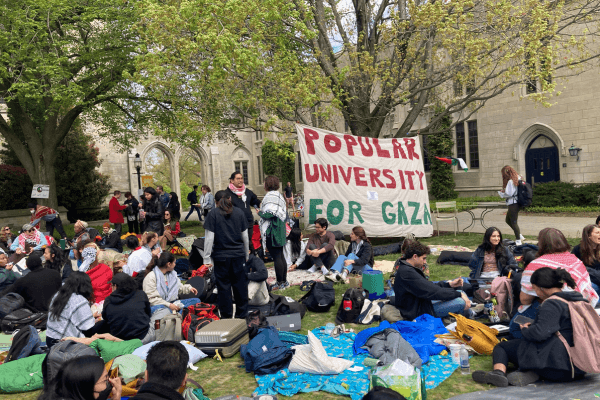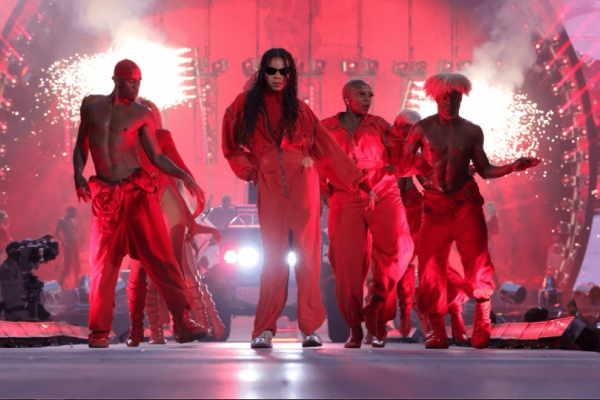In July of last year, an estimated 50,000 fans flooded Arrowhead Stadium in Kansas City to see Taylor Swift’s Eras Tour concert. Among those in the crowd was football tight end Travis Kelce, eager to woo Swift. Arrowhead has been central to Swift and Kelce’s romance ever since: After making their romance official last September, Swift has routinely joined the 76,000 Chiefs fans to cheer for Kelce and his teammates. From concertgoers to sports spectators, the thought of that many people in the same space is difficult to imagine. Equally hard to imagine, and significantly more heartbreaking, Israel Defense Forces have killed 25,000 Palestinians since Oct. 7, 2023; that number of people would fill about a third of Arrowhead Stadium.
This is a jarring image, but such is the reality of our present moment: While the state of Israel carries out a genocide against Palestinians, we are easily distracted by our adoration for Swift and Kelce, along with spectator sports. That we are this preoccupied with celebrity romance is no coincidence but, in fact, a main feature of our neoliberal society. Instead of imagining love as a concrete, revolutionary political practice, we are enamored by its simulacrum.
It’s not a surprise that one of the biggest sensations of our current popular culture involves Swift and her romantic endeavors. Love songs have been good for Swift’s bottom line — and her own love life is no exception. Having dominated the music industry for almost two decades and amassing over $1 billion in net worth, Swift’s songwriting has continuously invited the public into her most intimate relationships over the years. Whether “love’s a game” (“Blank Space”) that she beckons others to play with her, or love is the thing she’s “spent [her] whole life trying to put it into words” (“You Are In Love”), romantic love has been part and parcel to Swift’s identity as a musician.
Her most recent — and arguably most public — romantic relationship proves no different. Since Swift and Kelce made their romance public last September, they have been gifted the celebrity portmanteau, ‘Swelce,’ and have also been given a premium opportunity to capitalize on their popularity both as individuals and as a couple.
Inspiring everything from memes to the colors of the Empire State Building, the material evidence of our obsession with celebrity culture is evident in the spike of Chiefs jersey sales and the projected $5 million Kelce could gain in off-the-field earnings thanks to his involvement with Swift. In her youth, Swift once sang, “In your life, you’ll do things greater than dating the boy on the football team.” And yet, 15 years later, at a live show in Buenos Aires, she changed the lyrics of her song “Karma” to, “Karma is the guy on the Chiefs, coming straight home to me.”
In light of these monetary gains, the couple has been sure to keep up appearances: Swift has diligently attended the Chiefs football games throughout the season — including a frigid playoff game in January that was reported to have garnered the largest streaming audience ever. Looking to expand its audience, the NFL has taken every opportunity to show Swift in attendance. And yet, as we Americans obsess over the flourishing of an “all-American” love story, we’ve neglected to turn equal attention to a modern genocide. Why is it so easy to turn away and how do we resist this temptation?
In her book Religious Resistance to Neoliberalism, Keri L. Day argues that neoliberalism must not only be understood as an economic model but also as a cultural and political one. As a professor of constructive theology at Princeton Theological Seminary, Day understands neoliberalism as a “type of rationality and governmentality” that reshapes individuals into “enterprises.” In other words, within a neoliberal society, individuals can make businesses out of themselves, cashing in their established fame for endless fortune and providing consumers with endless distractions.
Begrudgingly or not, we’re all complicit in upholding celebrity enterprises. Swift and Kelce are masters at turning themselves and their romance into a business, and we are their customers.
When thinking about consumerism in a neoliberal society and how obsessed with celebrities’ romantic lives we’ve become, it’s important to recognize what this does to our moral systems and understandings of love. Day writes: “The horror of neoliberal societies is that it defines the good and beautiful in terms of profit rather than in terms of human connection and care.”
In her book All About Love: New Visions, Black feminist cultural critic bell hooks further argues that “[t]he cultural emphasis on endless consumption deflects attention from spiritual hunger.” Both Day and hooks emphasize how much we lose when we yield to neoliberalism by viewing love as an exclusively romantic and not also deeply spiritual and political phenomenon. By being engrossed in the romance of Swelce, our society has made it easier to tune out what is worthy of our undivided attention: The state of Israel’s indiscriminate bombing and displacement of Palestinians from their indigenous land, all of which is backed by U.S. military aid and tax dollars. Since early last fall, both Swelce and Palestine have been trending online, but one of those topics is far easier to engage with than the other.
Although Swift and Kelce have been publicly outspoken about the rights of marginalized groups, they have not spoken out against the atrocities taking place in Gaza and the West Bank. And while we shouldn’t expect celebrities to fill the void of political and moral authority, the issues that celebrities choose to speak about reveal something about our society. From Swift’s championing of LGBTQ+ rights and the Violence Against Women Act to Kelce’s endorsement of COVID-19 vaccines, they’ve presented themselves as celebrities who care about the rights of marginalized people. But their failure to speak out against Israel’s war crimes reveals their allegiance to our neoliberal society and the benefits it offers them: Swift’s Eras Tour film still played in Israeli theaters despite some fans pressuring her to boycott due to Israel’s treatment of Palestinians; similarly, Kelce has not been critical of the NFL showing favoritism to Israel while ignoring Palestine — despite his commitment to fighting racism.
While the commodification of their romance continues to be sold to the public as a love story, the price tag comes with a hefty moral cost for our collective future. In her critique of neoliberalism, Day offers love as a political tool through which we must imagine and build just futures. Love — which is different from and grander than romance — is a “movement toward each other” that influences “how we organize and behave as political communities.”
Day’s political understanding of love stands in stark contrast to Swift’s self-reflection on the song “Daylight,” from her 2019 album Lover: “I want to be defined by the things that I love, not the things I hate, not the things I’m afraid of, the things that haunt me in the middle of the night… I just think that you are what you love.” Swift’s discography proves she takes this mantra seriously as, over the years, she has waxed poetic about paramours, family members, and friends. Still, it seems obvious that her interpretation of love is more individualized than politicized.
According to Black feminists and womanists, love should never be about your personal brand or making a profit. Day reminds us that love is not only a private matter, but a public one that “enables individuals and groups to live together” with “respect, compassion, and empathy.” Whether through peaceful demonstrations, large-scale disruptions, or coalition building, we must use our love collectively to confront the systems that oppress and dispossess some while allowing others to remain untouched.
Expanding on the ideas of hooks and Alice Walker, Day presents “neighbor love” as an antidote to neoliberal rationality. “To love in this way,” Day explains, “is an affront to the exchange logic and value within neoliberalism because this kind of neighbor love makes no demand to reciprocate. This love is ‘violence’ to neoliberal systems in the sense that it seeks to overthrow current dehumanizing ways of being.” Applied concretely to the ongoing genocide in Palestine, revolutionary love can help us build bridges across differences — whether they be racial, religious, or political.
Dov Baum, the director of corporate accountability and research for the American Friends Service Committee, is an example of someone putting this kind of bridge-building into practice. An Israeli living in Oakland, Calif., Baum professionally tracks companies that benefit from Israel’s apartheid. In her personal life, she also participates in pro-Palestine demonstrations. Speaking with Sojourners’ news editor Mitchell Atencio, Baum explained why even though she does not always feel comfortable chanting all of the chants at these demonstrations, she still goes: “I go to demonstrations against the genocide in Gaza because I want to be with others that shout and call for the immediate stop of this unforgivable crime.” Despite differences, Baum is working to build bridges and embody a revolutionary politics of love.
Our obsession with Swelce is a neoliberal distraction keeping us disconnected from one another. As these celebrities steeped in fame, greed, and cowardice try their best to get us to buy into their romance, we must remain steadfast in seeing the humanity in one another, investing in each other’s survival, and fighting for a freedom that knows no bounds. We must love as Day, hooks, and many others have urged us to love — with political grit and revolutionary might.
Got something to say about what you're reading? We value your feedback!







